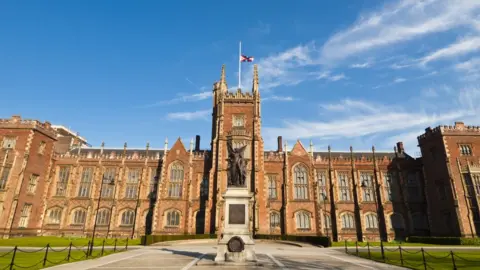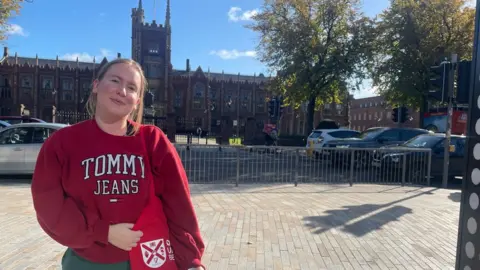Cost of living: Queen's University Belfast declares critical incident
 haoliang/Getty Images
haoliang/Getty ImagesQueen's University Belfast (QUB) has declared a "critical incident" due to the cost-of-living crisis.
The university is due to approve several measures to help staff and students deal with soaring costs.
Its vice-chancellor Prof Ian Greer said he wanted to ensure an "appropriate institutional response".
Queen's has been allocated £2.7m to be distributed as hardship funds this academic year as part of a wider support package.
This package of £5.6m is administered by the five higher-education institutions in Northern Ireland on behalf of the Department for the Economy's (DfE) .
Details of the measures planned by Queen's will be outlined within weeks.
In an internal email seen by BBC News NI, Prof Greer said he had established a "working group to develop a plan on the interventions that need to be taken" to support the university community.
"Once we obtain agreement on our response, we will communicate our action plan to students and staff with an announcement as soon as possible," he wrote.
He said there was an "urgent need" to improve internal decision-making processes at the university to deal with cost-of-living issues.
QUB students told BBC News NI that they found the "unwieldy" hardship fund application process involved "far too much paperwork".

'We can't afford student housing'

Hannah Hutchinson and Kotryna Ramanauskaite are both living with their families and say they would not be able to afford student housing.
"I would move out for the experience but, obviously, it's expensive. Having my mum there is handy," Ms Ramanauskaite said.
"Seeing everyone else move away and seeing how hard they're struggling to buy food [is off-putting]."
She added: "I know a lot of people in my course who say their entire student loan and maintenance grant go on their rent.
"There's a girl who is working full days, Friday, Saturday and Sunday - it leaves her very tight for studying."
Ms Ramanauskaite said she had considered applying for hardship funds last year but found the application process difficult.
"I've seen the form - you have to meet a lot of criteria," she said.
 Google
GoogleJack Grey said he has never heard of a hardship fund before, classmate Alwin Denny agreed that he wouldn't really know how to access one.
"I think there's a decent amount of focus on people who live in student accommodation," Alwin said when discussing how the university could help.
"But [there isn't] for students who live at home, who haven't as much financial burden on them."

Sophie McMurray recently moved to Belfast and said independent living has brought home the cost-of-living crisis.
She said the university hadn't directly offered advice relating to the crisis.
"If you want that [information] you have to go searching for it.
"It's not advertised anywhere you could find it easily... It's people on [internet] forums saying how to access it.
Another student, Jessica Allison, said the university had previously declined her application for financial aid.
This was because her bank balance included £500 set aside for rent.
"Last year I lost my job because of Covid... I was relying solely on my student loan to pay rent and cover travel, and they turned me down.
"They're very specific, they don't seem to actually help much," she said.

Anna Keow is studying in Belfast this semester, having travelled from the Netherlands as part of the study abroad Erasmus programme.
"We have free public transport back home and if you get your degree in a certain amount of years you don't have to pay it back," she said.
"That really helps because you need your money for food and stuff. Things are pricey as is, I think free transport would really help," she added.

In the 2021-2022 academic year, DfE had allocated £2m to Queen's University to help students facing financial hardship.
The university had exceeded £2.2m in hardship fund pay-outs by April 30, according to a response to a written question to the Northern Ireland Assembly in June.
Alliance Party MLA Eoin Tennyson said it was clear demand for the funds was outstripping supply.
A DfE spokesperson said the department recognised the affect the cost-of-living crisis was having on households across Northern Ireland, including students.
"Students who experience genuine financial hardship during the course of their studies can apply for additional support from the department's student support funds," the spokesperson said.
"This support, which is often referred to as hardship funds, can provide help to students who face financial difficulties in meeting their living costs.
"The department has impressed the need for appropriate flexibility from the local higher-education institutions when dealing with student applications, to ensure that any student who is experiencing genuine financial difficulty has access to support."
Research conducted by the National Union of Students (NUS) found that a third of students have a total monthly allowance of £50 after paying their rent and bills.
The union says 96% of students are "cutting back" as a result of the crisis.
An NUS spokesperson said: "We're hearing from students struggling to get by, who can't afford to do their laundry and are cutting back on showers to make ends meet. They can't even cover the cost of getting to the library or classes.
"This is having a severe impact on their mental health, being kept awake at night due to finances."
Northern Ireland's other universities have said they are supporting students during the financial squeeze.
A spokesperson for Ulster University said: "Funding applications are requested and assessed in accordance with DfE guidance - students need to create an online application form and provide basic evidence - confirmation of student funding, tenancy agreement (if applicable) and three months of bank statements.
"Completed applications with evidence are generally assessed and issued for payment within two-three weeks."
The university said it offered money management and budgeting workshops on campus and online and a dedicated student money team available for appointments.
"We are supporting the NUS-USI campaign around the 'cost of survival' for students, including introducing a yellow sticker system for unsold food on campus. We are working with UUSU to set up food and book banks for those in need," it said.
Stranmillis University College said it had noted an increase in the number of students with financial concerns.
It is providing a range of additional support packages including bursaries and a short-term interest-free loan.
New students, as a part of their Stranmillis induction programme, took part in a "budgeting exercise" in an attempt to increase their awareness of money management and budget planning.
